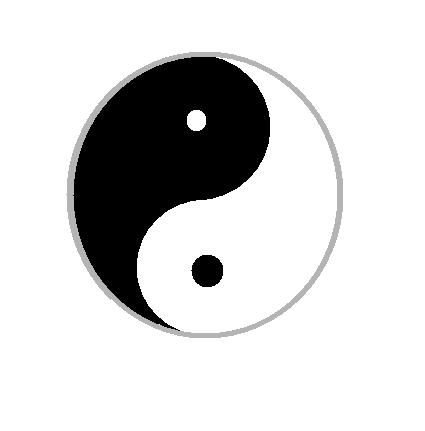Laozi's Dao De Jing 36-40 (老子道德經 36-40)
Author: Laozi (老子); translated by James Legge

(Those who) possessed the highest benevolence were (always seeking) to carry it out, and had no need to be doing so. (Those who) possessed the highest righteousness were (always seeking) to carry it out, and had need to be so doing.
第三十六章
將欲歙之,必固張之﹔將欲弱之,必固強之﹔將欲廢之,必固興之﹔將欲 取之,必固與之。是謂微明。柔勝剛,弱勝強。魚不可脫于淵,國之利器 ,不可以示人。
Chapter 36
1. When one is about to take an inspiration, he is sure to make a (previous) expiration; when he is going to weaken another, he will first strengthen him; when he is going to overthrow another, he will first have raised him up; when he is going to despoil another, he will first have made gifts to him:—this is called 'Hiding the light (of his procedure).'
2. The soft overcomes the hard; and the weak the strong.
3. Fishes should not be taken from the deep; instruments for the profit of a state should not be shown to the people.
第三十七章
道常無為而無不為。侯王若能守之,萬物將自化。化而欲作,吾將鎮之以 無名之朴。鎮之以無名之朴,夫亦將不欲。不欲以靜,天下將自正。
Chapter 37
1. The Tao in its regular course does nothing (for the sake of doing it), and so there is nothing which it does not do.
2. If princes and kings were able to maintain it, all things would of themselves be transformed by them.
3. If this transformation became to me an object of desire, I would express the desire by the nameless simplicity.
Simplicity without a name
Is free from all external aim.
With no desire, at rest and still,
All things go right as of their will.
第三十八章
上德不德,是以有德﹔下德不失德,是以無德。上德無為而無以為﹔下德 無為而有以為。上仁為之而無以為﹔上義為之而有以為。上禮為之而莫之 應,則攘臂而扔之。故失道而后德,失德而后仁,失仁而后義,失義而后 禮。夫禮者,忠信之薄,而亂之首。前識者,道之華,而愚之始。是以大 丈夫處其厚,不居其薄﹔處其實,不居其華。故去彼取此。
Chapter 38
1. (Those who) possessed in highest degree the attributes (of the Tao) did not (seek) to show them, and therefore they possessed them (in fullest measure). (Those who) possessed in a lower degree those attributes (sought how) not to lose them, and therefore they did not possess them (in fullest measure).
2. (Those who) possessed in the highest degree those attributes did nothing (with a purpose), and had no need to do anything. (Those who) possessed them in a lower degree were (always) doing, and had need to be so doing.
3. (Those who) possessed the highest benevolence were (always seeking) to carry it out, and had no need to be doing so. (Those who) possessed the highest righteousness were (always seeking) to carry it out, and had need to be so doing.
4. (Those who) possessed the highest (sense of) propriety were (always seeking) to show it, and when men did not respond to it, they bared the arm and marched up to them.
5. Thus it was that when the Tao was lost, its attributes appeared; when its attributes were lost, benevolence appeared; when benevolence was lost, righteousness appeared; and when righteousness was lost, the proprieties appeared.
6. Now propriety is the attenuated form of leal-heartedness and good faith, and is also the commencement of disorder; swift apprehension is (only) a flower of the Tao, and is the beginning of stupidity.
7. Thus it is that the Great man abides by what is solid, and eschews what is flimsy; dwells with the fruit and not with the flower. It is thus that he puts away the one and makes choice of the other.
第三十九章
昔之得一者:天得一以清﹔地得一以寧﹔神得一以靈﹔谷得一以盈﹔萬物 得一以生﹔侯王得一以為天下正。其致之也,天無以清,將恐裂﹔地無以 寧,將恐廢﹔神無以靈,將恐歇﹔谷無以盈,將恐竭﹔萬物無以生,將恐 滅﹔侯王無以貞,將恐蹶。故貴以賤為本,高以下為基。是以侯王自稱孤 、寡、不穀。此非以賤為本邪?非乎?故致譽無譽。是故不欲琭琭如玉, 珞珞如石。
Chapter 39
1. The things which from of old have got the One (the Tao) are—
Heaven which by it is bright and pure;
Earth rendered thereby firm and sure;
Spirits with powers by it supplied;
Valleys kept full throughout their void
All creatures which through it do live
Princes and kings who from it get
The model which to all they give.
All these are the results of the One (Tao).
2. If heaven were not thus pure, it soon would rend;
If earth were not thus sure, 'twould break and bend;
Without these powers, the spirits soon would fail;
If not so filled, the drought would parch each vale;
Without that life, creatures would pass away;
Princes and kings, without that moral sway,
However grand and high, would all decay.
3. Thus it is that dignity finds its (firm) root in its (previous) meanness, and what is lofty finds its stability in the lowness (from which it rises). Hence princes and kings call themselves 'Orphans,' 'Men of small virtue,' and as 'Carriages without a nave.' Is not this an acknowledgment that in their considering themselves mean they see the foundation of their dignity? So it is that in the enumeration of the different parts of a carriage we do not come on what makes it answer the ends of a carriage. They do not wish to show themselves elegant-looking as jade, but (prefer) to be coarse-looking as an (ordinary) stone.
第四十章
反者道之動﹔弱者道之用。天下萬物生于有,有生于無。
Chapter 40
1. The movement of the Tao
By contraries proceeds;
And weakness marks the course
Of Tao's mighty deeds.
2. All things under heaven sprang from It as existing (and named); that existence sprang from It as non-existent (and not named).
- Log in to post comments




Recent comments